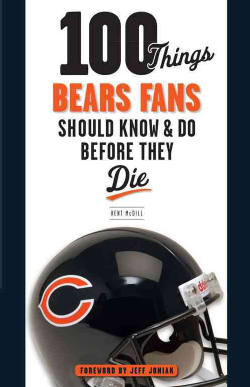| « Blackhawks Finding the Road Well-Traveled | Charles Tillman Should be Back with Bears in 2014 » |
Bears Wed Nov 13 2013
Review: 100 Things Bears Fans Should Know & Do Before They Die
 Ask any Bears fan within a 50-mile radius of the 312 area code to expound upon their favorite memory he or she has about the Monsters of the Midway, and chances are they'll mention any one of the 100 items listed in Kent McDill's new book, "100 Things Bears Fans Should Know & Do Before They Die."
Ask any Bears fan within a 50-mile radius of the 312 area code to expound upon their favorite memory he or she has about the Monsters of the Midway, and chances are they'll mention any one of the 100 items listed in Kent McDill's new book, "100 Things Bears Fans Should Know & Do Before They Die."
It's all in there, listed numerically in the contents section, seemingly ranked from most significant (#1. Papa Bear) to least (#100. Punters) and everything in between that everyone already should know, but, heck, should take the time to re-read and swell with emotion like a plumped-up brat sizzling away at a tailgate.
McDill, who covered the Bears from 1999 to 2007 for the Daily Herald, brings on Bears' radio play-by-play commentator Jeff Joniak to write the Foreword and mentions that the passion some 4.6 million Chicagoans feel for this team is a "generational bond, handed down from one decade to the next." To dig a little deeper into the psyche of the team-and-fanbase cohesive bond, the makeup of the Bears throughout the years embodies the hardworking, blue-collar approach that mirrors the day-in, day-out "Grabowskis" in the stands or at home watching and cheering along. We all are "Superfans" and this book is our reference point.
Starting with Halas in Chapter One is like Stanley Kubrick opening 2001: A Space Odyssey with "The Dawn of Man," and Papa Bear is the monolith, inspiring ingenuity to man in a league in his simplest and earliest form. Not only creating the ever-famous T-formation, drafting Dick Butkus, Gale Sayers and Mike Ditka -- to name a few -- and coaching the team for 40 years (40 years!!!), Halas also helped get the entire league off the ground and running by way of instituting a profit-sharing plan, as well as helping to institute the forward pass.
While the latter may not have been a consistent weapon throughout the decades (Cade McNown did not make the book), Papa Bear's influence from the Decatur Staleys to Super Bowl XLI, ring throughout and act as a reminder of why we sing out at the tops of our lungs whenever "Bear Down, Chicago Bears" (Chapter 49) plays over the loud speaker in Soldier Field and every bar around town.
The book gets started like Red Grange himself, galloping throughout history, making stops along the way to cover names like Richard Dent, Brian Urlacher and Johnny Lujack. Just the names themselves are enough to spark a memory of when and where we were the first time we saw them. The "Super Bowl Shuffle" chapter reminds us that at one time a team so confident after a loss, its only that season, made a music video for charity that claimed to blow our minds like they knew they would.
Iconic players and memorable games are layered throughout, ranging from Sid Luckman (Chapter Six), William "The Refrigerator" Perry (Chapter 34) and Dan Hampton (aptly placed in Chapter 99), to Super Bowl 20 (Chapter Three), the 1963 NFL Championship Game (Chapter 38) and everything you need to know about the Bears against their longtime rival Green Bay Packers (Chapter 7 -- at press time, the Bears held a narrow 91-87 advantage).
The more somber moments are recalled in the book, including Chapter 15, simply named "1986 (The Year After)," as well as the 1971 made-for-TV-movie Brian's Song, which was portrayed beautifully by Billy Dee Williams and James Caan, chronicling Gale Sayers's autobiography I Am Third about his friendship with Brian Piccolo, who ultimately perished from terminal cancer. The mere mention of the movie amongst any true Bears fan is enough to prompt a rub of the eyes and clearing of the throat.
It's clear and appropriate that most of the chapters in McDill's book surround perhaps the greatest Bear of them all: Sweetness. McDill describes in Chapter Two that the beginning of the 1970s marked a low point for the franchise with the early retirement of Sayers and the decline of Butkus. Then, in 1975, newly appointed general manager Jim Finks used his fourth pick in the 1975 draft on a kid from Jackson State University in Mississippi who went by the name of Walter Payton.
Sweetness is affectionately recalled in Chapter Two, but other chapters look at his best games, including Walter as a receiver/quarterback and even the infamous training ground Walter Payton's Hill. There's even a chapter dedicated to "Why Didn't Payton Score?" which, pardon the pun, bears no description here.
McDill's book is complete with 100 details throughout the 93-year history of the Chicago Bears, including every up-and-down moment that left us high and dry to go along with every Doug Atkins, Buddy Ryan and Ditka that left us cheering and questioning their every move. And while the "Spare Bears" even make an appearance in this keepsake (Chapter 70), there's no replacing the content McDill recalls so vividly regardless of whatever Bears generation you call your own.








